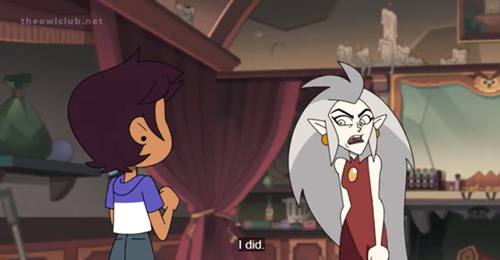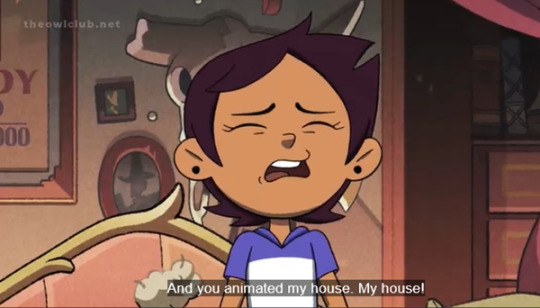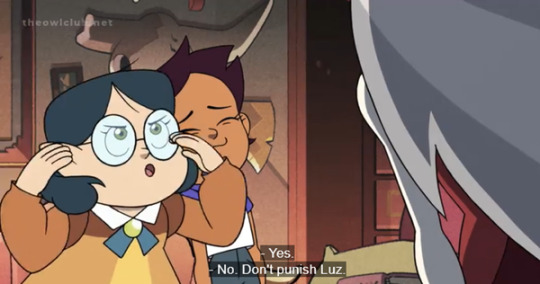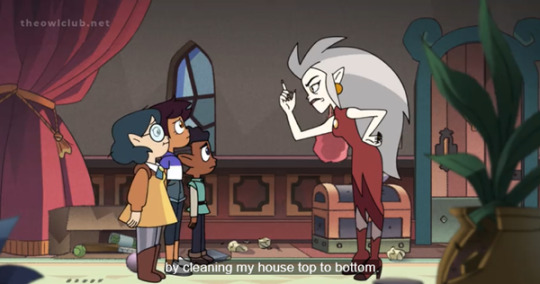#(I have a semi odd inconsistent character obsession...?)
Explore tagged Tumblr posts
Text

Comfort characters
#(I have a semi odd inconsistent character obsession...?)#(I love the studious harpy to a battle and train enthusiast)#(I guess they're both enthusiastic on something they like)#harpy monet#emmet#pokemon#one piece#crossover#kudari#submas#monet one piece
42 notes
·
View notes
Text
TOH rewatch semi-liveblog. Season 1 part 2
episodes 6-10
Episode 6
- Why is the opening theme such an earworm.
- 'dangerous nomads' ugh
- curious about the special moon powers and how they fit with the rest of the lore.
- Willow is yet again so good!
- Wh... what? Here is Eda, carelessly saying how she would never trust Luz again if Luz messes up and causing Luz stress, even after what happened in episode 2?

And then Eda even 'threatens' Luz - who even closes her eyes in the end - and Willow and Gus have to intervene, but it turns out Eda just wanted them to clean up the house? But, sure, Darius is the evil/stupid/irresponsible one.




And I am sure everyone in the fandom was obsessed with making Eda disproportionally guilty over this behaviour and twisted her whole character to be about it... right? Like, everyone was screaming how Camila would find out about Eda's behavior and hate her? And everyone was writing out their 'funny' fantasies about slapping and beating Eda up? What, no? Everyone declared Eda the best mom and thought she was better than Camila? And jokes about her irresponcibility and mistakes were good-natured and sympathetic? Weird...
(Sorry, i don't want to rag on Eda too much, but the racist double standarts are so, so obvious. Both in how Darius is treated vs Eda, but also how Luz is treated vs Hunter)
Episode 7
- The Bat Queen is the richest demon on the isles? Another thing i've forgotten completely. I kinda assumed she was a weird half-legendary hermit.
- Yeah, to be honest i don't care about Amity's siblings. Actually i think the Blight family should've been just Amity and one of her parents.
- I do dislike the switch in regards of Amity from previous episodes to this one. My problem is not that we see a different side of her or that Luz wants to befriend her after the Convention, but that Willow just doesn't seem to factor in any of this episode's events, and the episode is pushing this 'Amity just doesn't know how to interact with others without being cold because she can't show weakness' - which might be true in general and in regards of Luz, but doesn't work with how she treated Willow in previous episodes especially from Luz's point of view.
And so the switch between Luz calling Amity out in the previous episodes to simply declaring Amity her rival in this one, as if that's the only problem with Amity's behavior, is odd. If any of that was actually intentional and was adressed and there was an equal focus on Luz and Willow's relationship, then this could've been interesting to explore, but if not then they should've changed that first interaction between Amity and Willow. Or, idk, just put some mentions of Amity and Luz's relationships with Willow in the episode.
Because no, i don't think the audience has to be spoonfed and Amity being multifaceted is not the problem, but the show is not that subtle most of the times and this shift seems more unfocused than deliberate; and Luz wanting to make Willow and Amity friends again is also not a problem and makes sense for her character (more about it in Understanding Willow liveblog), but the pacing of the character arcs seem weird and inconsistent/unfocused, and Luz constantly ends up having less meaningful interactions with Willow and Gus compared to the white characters.
-Oh, but you might ask, why do you, numericalbridge, say you excuse Eda and Darius, but not Amity's writing? Well, first i don't think you can ignore the racial dynamics here. Second, Eda is one of the main characters, and we see her in various situations and so we can conclude that, for example, the moment from episode 4 where she 'threatens' King is more of unthoughtful writing choice than anything meant to be revealing about her character. And with Darius it's the opposite - he is not a main character, so his and Hunter's development happening off-screen is much more acceptable, and if you ignore the things that the fandom straight up invents about Darius the storyline is actually pretty streamlined. But Amity and Willow end up somewhere in between, where they are supposed to be core characters, and yet the storyline is neither here nor there, neither simple nor fully developed, and Willow is the one who gets the short end of the stick.
- And the thing is Amity has so much more focus in the first season but then gets less and less and then her arc ends up completed by the end of season 2 earlier than arcs of other main characters (except Gus who just barely has anything😠), and in season 3 Amity doesn't have much to do, but if her and Willow's relationship and the rekindling of their friendship got more even development from early on, then Amity could've been more deeply connected to Willow's arc in season 3 and it would've benefitted them both.
- And the easiest solution to my problem with Amity's arc would be to make the expulsion episode in season 2 about all of the hexsquad rather than only about lumity, and have Amity call out her parents - or just Alador if she isn't ready to call out Odalia - in regards of their treatment of Willow.
- Amity calling Luz a bully is sure a thing
- The rabbit thing serving as a parallel to Amity would've been great if the show was better about Willow and more consistent about Amity.
- I think it might've been better if Understanding Willow was an earlier episode and then this episode happened after, with prior glimpses of Amity trying to befriend Willow and Gus and being awkward about it.
- I think this is the moment where the show starts to drag, and introduces more unfortunate designs as well.
Episode 8
- This episode is so stupid, but the hints at Eda and Lilith's relationship and backstory are good.
- Luz is again very inventive with the idea to light the sign up! She just doesn't think through the more pragmatic parts because she is an excitable teenager.
- Eda is so silly with the body swap idea and the decision is also soooo abrupt, it's almost like something out of season 2b when they were running out of time. I still wouldn't call it the worst episode.
Episode 9
- The first Gus episode! Luz and Gus are so funny together, and it's such a shame how they are barely allowed to interact with each other afterwards. Because Gus is the one with the experience of feeling tricked! He probably was traumatized by what he saw in Belos's mind too! Ahhh😠
- Again, love that Eda is allowed to be angry about school.
- Matt is so manipulative and funny, lol.
- Interesting that Willow is the responsible one in this episode, but overall at this point in the show she doesn't tend to assume the group leader position yet.
- "No one gets left behind" - except all the other students in the detention pit?
Episode 10
-Missed opportunity to have some deeper interactions between Luz, Willow and Gus.
- The Bat Queen's plot would've been so good if not the design choice. Can't believe Hunter's fandom manages to demonize even her in the AUs
- "Yeah, results of Eda's great parental skill" says my note, but i can't remember what this refers too.
----
Conclusion:
This is where the show kinda starts to drag down, and the inability to balance the cast and character arcs becomes obvious. Shame, because Eda and Lilith, Luz and King, and Luz and Willow and Gus - when they are not just there for comedic scenes - are all excellent character dynamics.
#toh rewatch numericalbridge#toh rewatch liveblog#long post#the owl house#sorry for shitty screenshots i usually watch without subtitles so to make screenshots with subtitles i had to use a different source
3 notes
·
View notes
Photo

[The British monarchy:] Its mystery is its life. We must not let in daylight upon magic. We must not bring the Queen into the combat of politics, or she will cease to be reverenced by all combatants.
- Walter Bagehot
This was an exhortation made by one of the most venerated Victorians of his era and the founding editor of the Economist magazine, Walter Bagehot, to not drag Queen Victoria into the mudpits of political conflict. In his view, a politically-inactive monarchy served the best interests of the United Kingdom; by abstaining from direct rule, the monarch levitated above the political fray like a dignified David Copperfield, and remained a respected personage to whom all subjects could look to as a guiding light.
There has always been this odd nature of the relationship between hereditary monarchy and a society ambivalent about the institution.
Bagehot’s idea is accurate and unsustainable because we suffer from a national inability to think clearly about monarchy. The Windsors have been turned into a soap opera by a celebrity-obsessed culture — think of the media frenzy surrounding Diana, Charles and Camilla, Prince Andrew and his Epstein-related scandal, the differing opinions over Megxit (Prince Harry and Meghan Markle) etc. This is a culture determined to demand both daylight and magic.
The outcome is a contradictory belief that royalty are semi-sacred creatures who yet deserve censure when they manifest huffy or indecent behaviour. This inconsistency and lack of clarity is the source of the ad hominem arguments that frequently disfigure the republican case (and thank God for their ineptitude!)
At its best, royalty manifests the virtues of noblesse oblige. Elizabeth II embodies all that is greatest in a constitutional monarch. Her devotion to what she believes to be her duty has been unswerving — probably at considerable cost to her personal happiness — and she has refrained from interfering in the workings of our parliamentary democracy. It is open to question whether Charles III will display similar qualities of obligation and restraint.The public knows this, and is beginning to tinker with ideas that undermine the hereditary principle.
Ever alert to the possibilities of turning their readers’ prejudices to profit, the unscrupulous tabloids have played on the heir apparent’s unpopularity to make the case that the crown should skip a generation. (The Daily Mail commissioned a poll from ICM, and published the results on Monday. It said that 53 per cent of those questioned wanted the crown to pass directly to William.) William, good-looking and youthful, has hardly put a foot wrong and Kate Middleton even more so with the fashionistas gushing over every dress she wears daily and her down to earth manners typically bred of a Downe House girl.
A hereditary right to rule, and all the deference that goes with it, is either acceptable or it is not. If the nation decides in favour of monarchy, it must forgo its sentimental and selective attachment to those members and aspects of the institution that it likes. It should accept that the next in line — whatever his appeal to popular taste — is the rightful head of state.
If it believes that to be undesirable, then alternatives must be examined. The current trend is for a tawdry populism that offers a comfortable substitute for the more demanding pursuit of true egalitarianism. We cannot continue with the illusion that majesty can co-exist with a self-congratulatory exaltation of all that has the most facile appeal.
Nor does it make sense to fantasise about a Scandinavian-style bicycling monarchy: we must make up our minds about hereditary privilege and its attendant flummery. Bagehot explained it thus: “There are arguments for not having a Court, and there are arguments for having a splendid Court; but there are no arguments for having a mean Court.”
Aware of the growing aggression of facile populism, the Windsors have nodded to the idea of a leaner and meaner Court, in the hope of preserving their status. But paying income tax and reducing the number of flunkies on the payroll is meaningless: the protocol and elaborate costumes look the same as they did in the early years of the past century. It can be no other way: the tradition is designed to appeal to sentiment and to coerce consensual servility.
The present Queen, now 94 years old, has done a splendid job in her duties and in many ways far exceeded her own father, King George VI in our affections. Her values are very old fashioned rooted as she is in her humble and unassuming Christian faith and it shows. She is both modest, courteous, duitful and has the common touch. She scrupulously doesn’t rock the boat. She takes the institution seriously (but not herself as many can attest). In many ways her character and personality have defined the monarchy. We can’t separate the personal from the political: Elizabeth as a woman and Elizabeth as the HM The Queen. Despite a few mis-steps she is the model of how we think a monarch should behave.
What comes after is more uncertain. The monarchy will survive - regardless of Megxit, Prince Andrew’s scandals, or even if (heaven forbid) Scotland breaks away - in some shape or form. The monarchy represents, for better or for worse, the nation’s love affair with the past. Every time we see the Queen wearing a centuries-old crown, walk through the Houses of Parliament to celebrate the even older deal struck between Commons and Crown, we reach for another digestive biscuit to dunk in our mug of English Breakfast tea.
In recent years the theory has been modified, to acknowledge the changes that have come to the British monarchy. The strength of our royals – so this theory runs – is that they are prepared to change when necessary.
We love tradition, especially when it is softened by a little flexibility. But maybe the real secret to the long success of the British monarchy is its connection, not to the stodgy old ways of the stately home, but to the aggressive, thrusting, young nation that we used to be.
By this theory, the reason we’ve never had a lasting revolution [against the monarchy] is that we got there so early. We executed King Charles I at a time, 1649, when the major states of Europe hardly knew an alternative to monarchy. After that we were immunised against revolution, and the immunity has lasted until the present day.
For this touches another eternal truth about the British and how they cope with the competing pull between preserving tradition and incremental change. The British character tends towards compromise. That is both its strength and its weakness. The present attitude to monarchy displays only the weaknesses of ambiguity.
And perhaps that is the best that can be expected: preserve the mystery through ambiguity. Americans and other Europeans are used to kicking cans down the road but we British prefer to muddle through by smudging and fudging. Perhaps we all need to go back to Bagehot to preserve the mystique of the monarchy and not allowing itself to become the subject of celebrity tittle tattle and drama queens in a TV soap opera.
#monarchy#queen elizabeth II#george VI#bagehot#walter bagehot#quote#britain#queen victoria#institution#society#culture#nation#reform#what comes after elizabeth II
28 notes
·
View notes